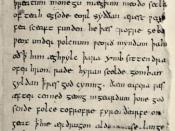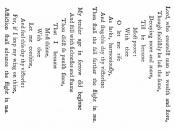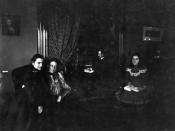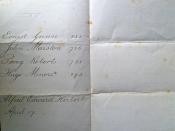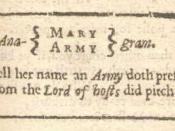Jason Chappell 12/11/01 Poetry Analysis Poetry Analysis "The Collar"ÃÂ George Herbert was one of the most innovative and complex poets in the history of English verse. In his poem "The Collar"ÃÂ he takes on a persona going through a variety of thoughts, perhaps originating from a spiritual event in Herbert's life. It shows a conflict in beliefs due to a tragic experience in the persona's life. This conflict causes a struggle filled with wit, logic, and passion. Using aspects of the poem such as the persona, its change in tone, and the meaningfulness of the title to the poem, Herbert is able to portray a spiritual journey through the theme of his poem.
Herbert portrays the theme of "The Collar"ÃÂ through a conversation the persona has between himself and perhaps his almighty Lord. In the beginning of the poem the persona starts out by saying he will remove himself from his prior beliefs.
He now says that his life is free to go in any direction. He is not held down because of what he had previously believed in. The persona is confused because of a recent event which has happened to him. He believes he has gained nothing from what he has been doing. This is best expressed through a metaphor when Herbert writes: "Have I no harvest but a thorn"ÃÂ In this line he compares the harvest to what he has gained in life in the recent past. This may be due to a broken relationship or the loss of a loved one. The persona goes on to talk about how he has nothing to show for the last year. This causes him to question the beliefs he had. These beliefs are mainly shown to be religious beliefs he had in following the Lord's ways. He says it seems like the almighty Lord is blind to his problems and is not fair to him. This is expressed when he writes: "Thy rope of sands, Which petty thoughts have made, and made to thee Good cable, to enforce and draw, And be thy law, While thou didst wink and wouldst not see."ÃÂ The persona is saying that people have made the word of the Lord the law to follow. But the persona thinks these words are untrue because the almighty Lord does not seem to see and help his pain. Therefore he says he will go away from his prior beliefs of following the Lord's word. He talks wildly but then at the end, he hears the Lord calling and he realizes the consequences of his foolish thoughts. This whole series of events is like a spiritual journey of one questioning his religious faith. This thought process can be common for people who start to wonder that if what they were taught to believe in is truly right or not.
One of the main ways Herbert gets his message across is by using the persona and the change of tone the persona goes through. At the beginning of the poem the persona starts out with a very angered tone. This is shown when Herbert writes: "I struck the board, and cried, "ÃÂNo more.
I will abroad!'"ÃÂ The persona shows anger here by striking the table and strongly saying that he will change. Then the persona moves into a state of questioning. He is wondering if his beliefs have led him to hard times when he writes: "Is the year only lost to me? Have I no bays to crown it? No flowers, no garlands gay? all blasted? All wasted? The persona here has clearly gone through a tragic event which leads him to believe that he has been wasting his time with what he believes in. Then again the persona moves towards a state of madness. He decides he will have to change his ways when he says: "Away! take heed: I will abroad."ÃÂ This shows that the persona has made up his mind about changing his beliefs. He continues raving until the end of the poem where he hears a voice from God: "Me thoughts I heard one calling, Child! And I replied, My Lord.
The tone of the poem suddenly changes in these lines from angered to a sort of repenting. The persona has realized the that the Lord does hear him and understand him. Because of this he calls back to the Lord. All these changes in the tone of the poem help Herbert to send across his message.
Another way Herbert portrays the meaning of the poem is the relationship between the title of the poem and the poem itself. The way Herbert cleverly discusses the relationship between a person and their beliefs in God, it is like a collar around their neck. It is sort of like a collar on a dog. A curious dog may wonder off, but with their collar they will always end up returning to their master. A person can stray from their beliefs in Christ but in the end, they will most likely come back to the Lord. Just like the dog did to their master.
In the end, Herbert is able to portray his theme through the tone of the persona and the title, as well as his clever use of metaphors throughout the poem. These aspects of the poem have made it seem as a kind of spiritual journey through the thought process of a person and the conflicts which may arise. In the end, one is able to seek redemption in the fact that they have came back to the Lord and are now stronger because of it.
